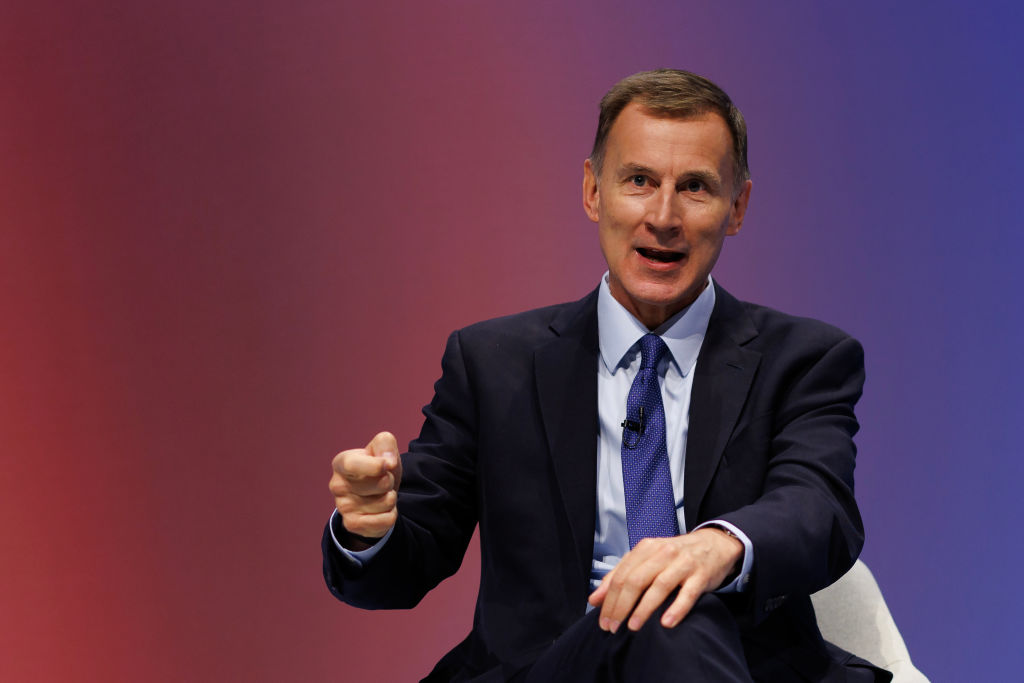Jeremy Hunt: Tech and defence will make Britain great again - investors should stay or risk missing out
For investors shifting away from the UK, tech and defence may well be opportunities worth staying for, the former chancellor Jeremy Hunt says.


Get the latest financial news, insights and expert analysis from our award-winning MoneyWeek team, to help you understand what really matters when it comes to your finances.
You are now subscribed
Your newsletter sign-up was successful
Want to add more newsletters?

Twice daily
MoneyWeek
Get the latest financial news, insights and expert analysis from our award-winning MoneyWeek team, to help you understand what really matters when it comes to your finances.

Four times a week
Look After My Bills
Sign up to our free money-saving newsletter, filled with the latest news and expert advice to help you find the best tips and deals for managing your bills. Start saving today!
What will make Britain great again is perhaps a question most politicians would struggle to answer, but for the former Conservative chancellor, Jeremy Hunt, it’s tech, defence, and getting people back to work.
“There is a growing realisation that there are one or two sectors which are going to massively grow this century. Where the UK is particularly strong is technology for one, where we are the third-largest tech ecosystem in the world, after the US and China," Hunt said this week
“We don't boast about it very much, because we don't have very many British tech giants. But actually it's like the City of London. It is very, very strong in tech, even though many of the players are international, and that's really based on the fact that outside the US, we have the most respected universities in the world, and they are now churning out through their ecosystem start-ups in a way that's never happened before.
MoneyWeek
Subscribe to MoneyWeek today and get your first six magazine issues absolutely FREE

Sign up to Money Morning
Don't miss the latest investment and personal finances news, market analysis, plus money-saving tips with our free twice-daily newsletter
Don't miss the latest investment and personal finances news, market analysis, plus money-saving tips with our free twice-daily newsletter
“The second really big sector is defence. Britain has one of the biggest defence sectors in Europe. That is an area where, sadly, we are only going to spend much more in the years ahead.”
Defence stocks have risen in recent months, following increased spending commitments as European tensions with Russia rise.
Hunt, who was speaking at the annual Guinness Global Investors conference, added that it was vital that the government recognises the importance of making sure defence spending also goes towards start-ups, not just the three big names. This will drive the growth.
UK debt problem
Hunt went on to say that debt was the UK's biggest problem, admitting that Rachel Reeves had a “very difficult" job as chancellor. He also said there is a chance taxes may go up in the forthcoming Budget.
“Finance ministers and prime ministers and presidents have had to choose between tax, between borrowing and between spending, and they've basically done a mixture of tax then borrow.
“So, centre right governments have tended to tax a bit less and borrow a little bit to help oil the wheels. Centre left governments have tended to spend a bit more and borrow a bit to help oil the wheels. Now what's happened is the markets have taken borrowing off the table, and what that means is that markets are now setting fiscal policy, not politicians.”
Hunt added that if Reeves wants to increase spending, she will have to increase taxes right away to pay for it. “This Budget is going to be difficult for Rachel Reeves, I think that job has become a lot harder.”
While Reeves had a £9.9 billion fiscal buffer back in the Spring Statement, this is likely to have morphed into a £20 billion shortfall, according to analysts.
But while tax hikes could be a way to balance the books, Reeves will need to be careful not to damage growth.
Some tax hikes we could see include extending the tax threshold freeze, making changes to salary sacrifice arrangements, as well as changes to the tax-free pensions allowance.
We take a closer look in our article: Will taxes rise further in the 2025 Autumn Budget?
Welfare reform
Hunt said if there was one policy he would like Reeves to revisit, it is that of welfare reforms.
“The one which I really hope she comes back to is welfare reform. The simple truth is, if we got our working-age benefit bill... down to the levels it was at just five years ago when Trump came for that last state visit, it saves about £50 billion a year. That's about six-tenths of income tax.”
He said mental health was one of the main reasons people were not working.
“The thing people with anxiety or depression need more than anything else is social contact. By signing them off work, you're actually reducing social contact. We should be treating anxiety and depression and it is far cheaper than parking people on benefits.
“So that, I think, is the big decision that most people in Westminster would like to see from the government. We understand it's not easy. We know it didn't even work last time, but I wouldn't be surprised if the government comes back to this, because the logic for welfare reform is still overwhelming.”
Hunt added there was also potential to reform stamp duty and increase council tax bands for higher value properties.
Get the latest financial news, insights and expert analysis from our award-winning MoneyWeek team, to help you understand what really matters when it comes to your finances.
Kalpana is an award-winning journalist with extensive experience in financial journalism. She is also the author of Invest Now: The Simple Guide to Boosting Your Finances (Heligo) and children's money book Get to Know Money (DK Books).
Her work includes writing for a number of media outlets, from national papers, magazines to books.
She has written for national papers and well-known women’s lifestyle and luxury titles. She was finance editor for Cosmopolitan, Good Housekeeping, Red and Prima.
She started her career at the Financial Times group, covering pensions and investments.
As a money expert, Kalpana is a regular guest on TV and radio – appearances include BBC One’s Morning Live, ITV’s Eat Well, Save Well, Sky News and more. She was also the resident money expert for the BBC Money 101 podcast .
Kalpana writes a monthly money column for Ideal Home and a weekly one for Woman magazine, alongside a monthly 'Ask Kalpana' column for Woman magazine.
Kalpana also often speaks at events. She is passionate about helping people be better with their money; her particular passion is to educate more people about getting started with investing the right way and promoting financial education.
-
 Should you buy an active ETF?
Should you buy an active ETF?ETFs are often mischaracterised as passive products, but they can be a convenient way to add active management to your portfolio
-
 Power up your pension before 5 April – easy ways to save before the tax year end
Power up your pension before 5 April – easy ways to save before the tax year endWith the end of the tax year looming, pension savers currently have a window to review and maximise what’s going into their retirement funds – we look at how
